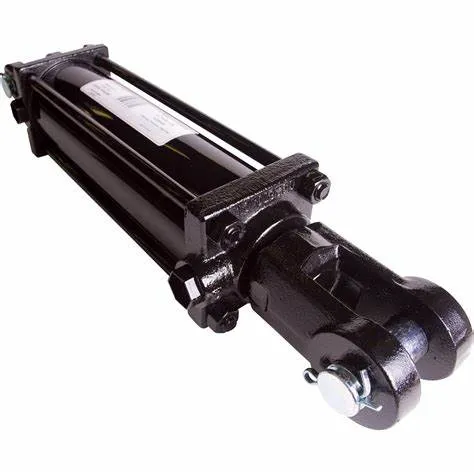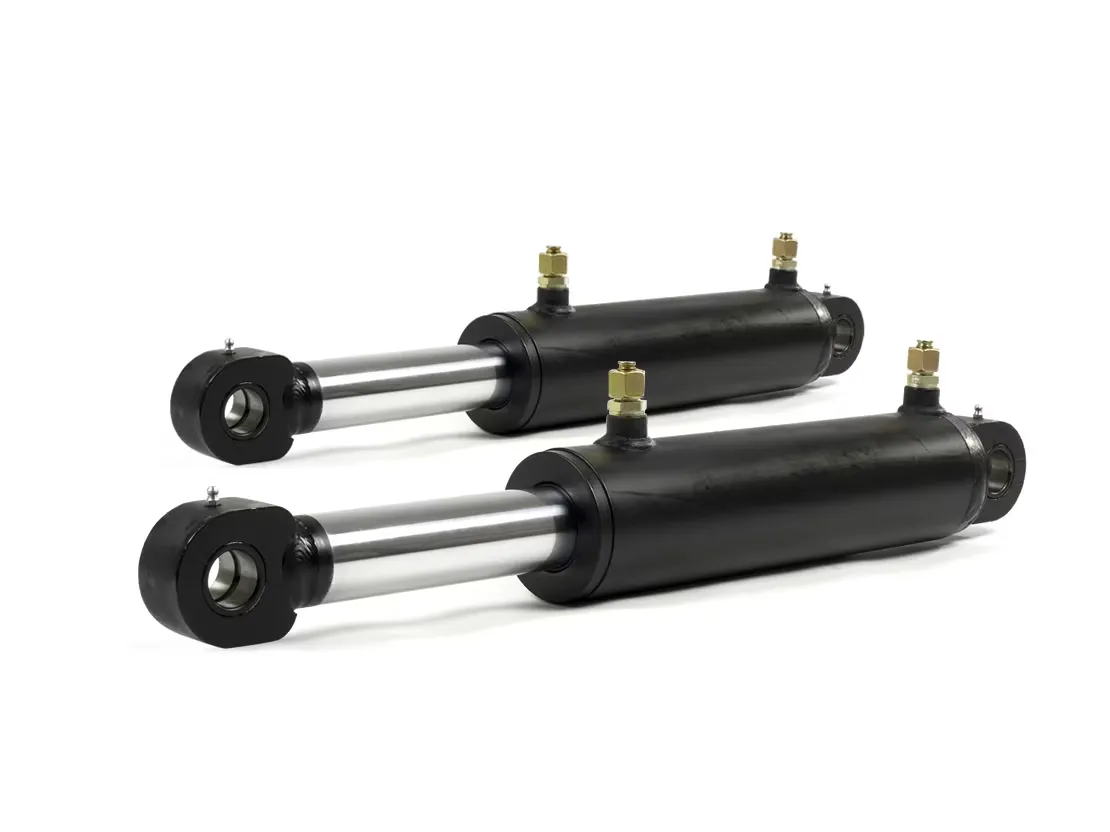The Key Components of Industrial Hydraulic Cylinder Control Systems
Introduction to Industrial Hydraulic Cylinder Control Systems
Industrial hydraulic cylinder control systems play a crucial role in various industrial applications, providing the power and precision needed to operate heavy machinery and equipment. These systems use hydraulic cylinders to convert fluid power into mechanical force, allowing for smooth and efficient movement in industrial environments.
Key Components and Structure of Hydraulic Cylinders
Hydraulic cylinders consist of several key components, including a cylinder barrel, piston, piston rod, seals, and hydraulic fluid. The cylinder barrel houses the piston, which moves back and forth within the cylinder to generate force. The piston rod connects the piston to the external load, transmitting the force generated by the hydraulic fluid. Seals prevent leakage of hydraulic fluid, ensuring the system operates smoothly. Hydraulic fluid is used to transmit force within the system, providing the necessary power for operation.
Principle Overview of Control Cylinder Operation
The operation of hydraulic cylinders is based on Pascal’s Law, which states that pressure exerted on a fluid is transmitted equally in all directions. When hydraulic fluid is pumped into the cylinder, it creates pressure that pushes against the piston, generating force. This force is then transferred to the piston rod and external load, allowing for controlled movement of machinery and equipment.
Types of Hydraulic Cylinders in Industrial Applications
Single Acting Cylinders
Single acting cylinders use hydraulic pressure to extend the piston, with an external force such as gravity or a spring retracting the piston back to its original position. These cylinders are commonly used in applications where a load needs to be lifted or lowered with controlled force.
Double Acting Cylinders
Double acting cylinders use hydraulic pressure to extend and retract the piston, providing bi-directional force for pushing and pulling applications. These cylinders are versatile and widely used in various industrial settings for precise control and movement.
Telescopic Cylinders

Telescopic cylinders consist of multiple nested stages that extend and retract in a telescoping motion, providing extended stroke lengths in a compact design. These cylinders are ideal for applications where space is limited but a long stroke is required.
Differential Cylinders
Differential cylinders operate using two different sized pistons, creating a force imbalance that results in controlled movement. These cylinders are often used in applications where precise force control is necessary, such as in lifting and pressing operations.
Advantages of Industrial Hydraulic Cylinder Control Systems
1. High Power and Precision: Hydraulic cylinders provide high force output and precise control for demanding industrial tasks.
2. Versatility: Hydraulic cylinders can be customized to meet specific application requirements, making them suitable for a wide range of industrial uses.
3. Durability: Hydraulic cylinders are built to withstand harsh operating conditions, ensuring long-term reliability and performance.
4. Efficiency: Hydraulic systems are energy-efficient, offering cost savings and environmental benefits in industrial operations.
5. Safety: Hydraulic systems can be equipped with safety features to protect operators and equipment from potential hazards, enhancing workplace safety.
Industries Using Industrial Hydraulic Cylinder Control Systems
Manufacturing
In manufacturing industries, hydraulic cylinders are used in various applications such as metalworking, assembly lines, and material handling. The precise control and high force output of hydraulic cylinders improve efficiency and productivity in production processes.
Construction
Construction companies rely on hydraulic cylinders for heavy lifting, earthmoving, and equipment operation. Hydraulic cylinders provide the power and control needed for construction machinery to perform demanding tasks on construction sites.
Mining
In the mining industry, hydraulic cylinders are essential for drilling, excavation, and material transport. The rugged design and high performance of hydraulic cylinders make them ideal for use in the challenging conditions of mining operations.
Agriculture
Agricultural equipment and machinery utilize hydraulic cylinders for tasks such as planting, harvesting, and irrigation. The efficiency and reliability of hydraulic systems contribute to increased productivity and yield in agricultural production.
Other Industrial Sectors
Hydraulic cylinders are also used in industries such as transportation, forestry, and marine applications. The versatility and performance of hydraulic systems make them indispensable for a wide range of industrial operations.
Selecting the Right Industrial Hydraulic Cylinder
When choosing an industrial hydraulic cylinder for a specific application, factors such as load capacity, stroke length, bore size, and operating pressure must be considered. Matching the performance of the hydraulic cylinder to the requirements of the application is essential for optimal operation and efficiency.
Maintenance and Care of Industrial Hydraulic Cylinders
Regular maintenance and care of industrial hydraulic cylinders are crucial for ensuring optimal performance and longevity. Inspection, lubrication, and cleaning are key practices that can help prevent issues and extend the service life of hydraulic systems.
Installation Guide for Industrial Hydraulic Cylinders
Proper installation of industrial hydraulic cylinders is essential for safe and efficient operation. Following manufacturer guidelines and using appropriate tools and equipment can help ensure that hydraulic systems are installed correctly and function as intended.
Maintenance Tasks for Industrial Hydraulic Cylinders
Cleaning
Cleaning hydraulic cylinders regularly helps prevent the buildup of dirt and debris, which can affect performance and cause damage to the system. Use a mild detergent and clean cloth to remove contaminants from the cylinder surface.
Lubrication
Lubricating hydraulic cylinders with the appropriate oil or grease helps reduce friction and wear, ensuring smooth operation and prolonging the life of the system. Follow manufacturer recommendations for lubrication intervals and types of lubricants to use.
Checking Wear
Regularly inspecting hydraulic cylinders for signs of wear, such as leaks, corrosion, or damage to seals, can help identify potential issues before they escalate. Replace worn components promptly to prevent system failure and downtime.
Fault Diagnosis and Common Problems
Common problems with industrial hydraulic cylinders include fluid leaks, seal failures, and piston damage. Diagnosing these issues requires thorough inspection and testing, followed by proper troubleshooting and repair procedures to resolve the problem effectively.
Preventive Measures for Industrial Hydraulic Cylinders
To minimize potential problems and optimize the performance of hydraulic cylinders, preventive measures such as regular maintenance, proper lubrication, and monitoring system performance are essential. By taking proactive steps to care for hydraulic systems, operators can prevent costly repairs and downtime.
How to Choose the Right Industrial Hydraulic Cylinder
When selecting an industrial hydraulic cylinder, factors to consider include load capacity, stroke length, operating pressure, and mounting options. By exploring these key considerations and matching the performance of the cylinder to the specific application requirements, operators can ensure optimal performance and efficiency.
Long-Tail Keywords for Industrial Hydraulic Cylinder Control Systems
1. “High-Performance Telescopic Hydraulic Cylinders: A Comprehensive Guide”: This article explores the features and applications of telescopic hydraulic cylinders in industrial settings, highlighting their benefits and considerations for optimal performance.

2. “Enhancing Productivity with Double Acting Hydraulic Cylinders”: Discover how double acting hydraulic cylinders improve efficiency and control in industrial operations, with real-world examples and case studies showcasing their versatility and performance.
3. “Maximizing Safety with Differential Hydraulic Cylinders”: Learn how differential hydraulic cylinders provide precise force control and safety features for industrial applications, with expert tips on selecting and maintaining these specialized systems.
Our Company: A Leading Hydraulic Cylinder Manufacturer
We are a reputable hydraulic cylinder replacement manufacturer, offering a complete product line of high-quality hydraulic systems for industrial applications. With a focus on professional service, international certification, customized solutions, advanced production equipment, and reliable after-sales support, we have established ourselves as a trusted provider in the domestic and foreign markets.
Author: lyl
